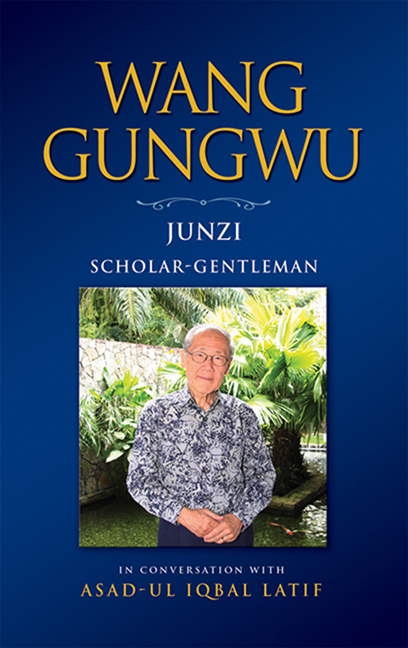Book contents
- Frontmatter
- Contents
- Foreword
- Wang Gungwu: Friend, Mentor and Role Model
- Junzi: Scholar-Gentleman
- INTERVIEWS WITH PROFESSOR WANG GUNGWU
- Being Chinese in Malaya
- Malaysia, Singapore and Australia
- Vietnam
- Hong Kong
- China Rising
- Taiwan, Japan and India
- The United States, Terrorism and War
- Half a Century of Marriage: An Interview with Mrs Margaret Wang
- Appendices
- Index
- Plate Section
The United States, Terrorism and War
from INTERVIEWS WITH PROFESSOR WANG GUNGWU
Published online by Cambridge University Press: 09 November 2017
- Frontmatter
- Contents
- Foreword
- Wang Gungwu: Friend, Mentor and Role Model
- Junzi: Scholar-Gentleman
- INTERVIEWS WITH PROFESSOR WANG GUNGWU
- Being Chinese in Malaya
- Malaysia, Singapore and Australia
- Vietnam
- Hong Kong
- China Rising
- Taiwan, Japan and India
- The United States, Terrorism and War
- Half a Century of Marriage: An Interview with Mrs Margaret Wang
- Appendices
- Index
- Plate Section
Summary
Do you share the view that the United States is the offshore balancer that helps to keep the peace between China and Japan?
That's taking a narrow, Southeast Asian point of view. The United States is a superpower. By definition, a superpower takes on responsibility for the whole world and is active or is prepared to be active everywhere. At least, by definition, a superpower is expected to take on certain responsibilities. American internationalists believe that their country's wealth and power compel the United States to do some good. This is an idealistic and liberal interpretation of a blessing. It is a burden as well, but one that has to be shouldered. The United States is responsible for helping keep international peace and ensuring its own security. The two are not contradictory because the security of the United States depends on its capacity to act as a superpower successfully. So that is why when it is challenged, and has not been so successful in some places, it's a real anguish for it to know what it should do. Does it continue to carry on a responsibility when it knows it is unable to do it without a lot of help? Should it resist the “America first” idea, which is the narrow-minded, realist view that America should look after its own interests and ensure only that nobody can threaten it? That debate is going on in the United States.
So when you say that America is an offshore balancer, that's speaking from a Southeast Asian or smallcountries’ point of view. It is not how Americans would see themselves. It's a very small part of “the city on the hill” idea, the inheritance of a manifest destiny. The United States can be expected to be helpful wherever it is needed and where it is wanted. If that is how those small countries out there want the United States to participate in their security against big powers in the neighbourhood, like China or Japan or India, the Americans can be expected to do their best. But this point of view has its limits. It would be a mistake to call it an offshore balancer.
- Type
- Chapter
- Information
- Wang GungwuJunzi: Scholar-Gentleman in Conversation with Asad-ul Iqbal Latif, pp. 116 - 121Publisher: ISEAS–Yusof Ishak InstitutePrint publication year: 2010

